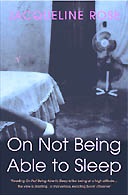
On Not Being Able to Sleep: Psychoanalysis and the Modern World
by Jacqueline Rose
(Vintage, £8.99)
Freud once said - and the remark is quoted in this book - "the use of analysis for the treatment of the neuroses is only one of its applications", and he recommends it as a tool for "historians, psychologists of religion, philologists and so on". It would appear that he has been taken at his word, for analysts such as Adam Phillips regularly treat us to their views on literature, or any other topic (I particularly recommend Darian Leader's Stealing the Mona Lisa: What Art Stops Us From Seeing). And they are good at it, perhaps more objectively successful than they are at curing people. (Do this thought experiment: imagine an analysand shaking the analyst's hand and saying "Thank you, I feel so much better now.")
Jacqueline Rose, interestingly, comes from the other direction: she is a professor of English who writes about psychoanalysis. You might not have thought so: she has mastered the jargon and can say, without blushing, that the image of "the wind gagging my mouth with my own blown hair" in Sylvia Plath's poem "The Rabbit Catcher" "calls up the image of oral sex".
She made that remark in her book The Haunting of Sylvia Plath; she reprints it here, in context, as part of the story of the almighty row she got into with Ted Hughes and the Plath estate. The essay dealing with this, winningly called "Sylvia Plath - Again", is not only, oral sex aside, a rewarding look at Plath's verse, but one of the most fascinating bulletins from the eternal conflict between biographer and author. My instinct is to take sides against the biographer, but when she begins a piece with the words "How not to write a biography of Sylvia Plath?" you at once see her point, and the essence of her dilemma.
Rose is an expert elucidator and sympathiser with other literary women at the borderlines of sanity: the pieces here on Virginia Woolf, Christina Rossetti and Anne Sexton should close off any doubts about the worth of this collection, whatever you think of those writers. And the first and two final essays, "Shame", "The Cult of Celebrity" and "Apathy and Accountability" (the last an examination of some of the odder reaches of South Africa's truth and reconciliation commission) are, one feels, the last words on the subject; or would be, if she were not so good at opening up areas that deserve further exploration. Such as this, in "Shame": "What would authority look like if it acknowledged itself to be driven by the unconscious, instead of seeing itself as more urbanely subject of, and to, its own laws?" (Actually, we know pretty well what it would look like, and a page later she reminds us that Woolf, on holiday in Germany in 1935, found herself raising "her arms in salute" when caught up in a heil-Hitlering crowd.)
Other parts of the book - be warned - are tough. A reader with no prior interest in the proceedings of the International Psychoanalytic Association, and Lacan's rupture with it in 1963, may find the essay "What Makes an Analyst?" somewhat hard going (at one point, eyelids drooping, I caught myself retitling the book On Being Able to Fall Asleep Surprisingly Easily) - which is a pity, as it asks the very important question of how one gets to be a psychoanalyst. Even when Rose is at her most humourlessly dogged, it is worth persevering: there will be a remarkable insight or a well-phrased question around the corner. In a piece on Adrienne Rich and Natalie Angier, a rather knotty look at internecine feminist argument, she reminds us of Brecht's dictum that, pace Michael Howard, every time a man struggles for his family another falls into the gutter.
I note in passing that there are a surprising number of slips for a book that contains so much about and from the author of The Psychopathology of Everyday Life. I suppose Matt ffytche will not mind too much about being given a capital f, but he, along with quite a few others, didn't make it into the index; and the LRB's Ross McKibbin may feel aggrieved at being referred to throughout as the hominoidal Ross McGibbon. What can be going on at the back of Rose's mind?

